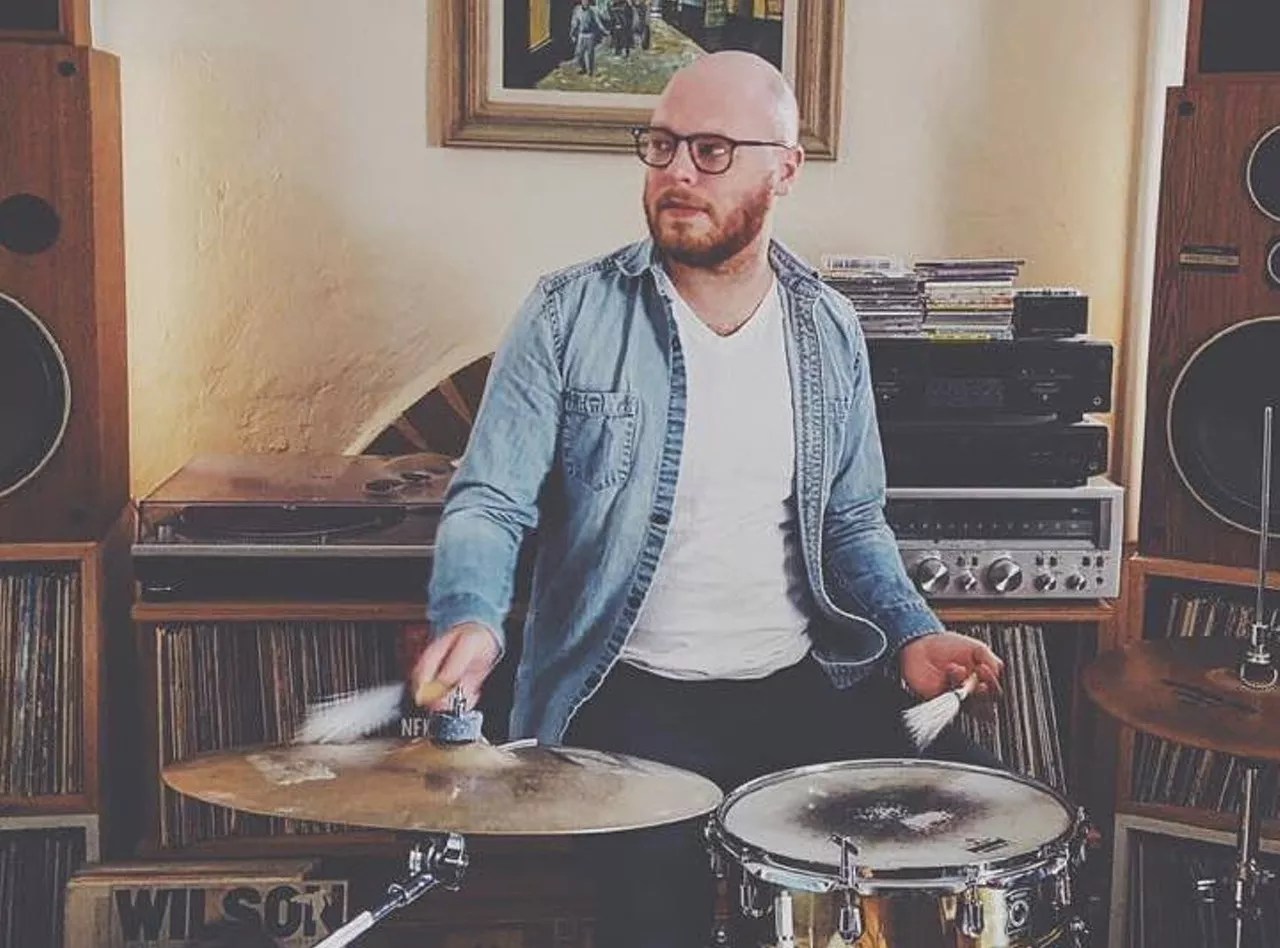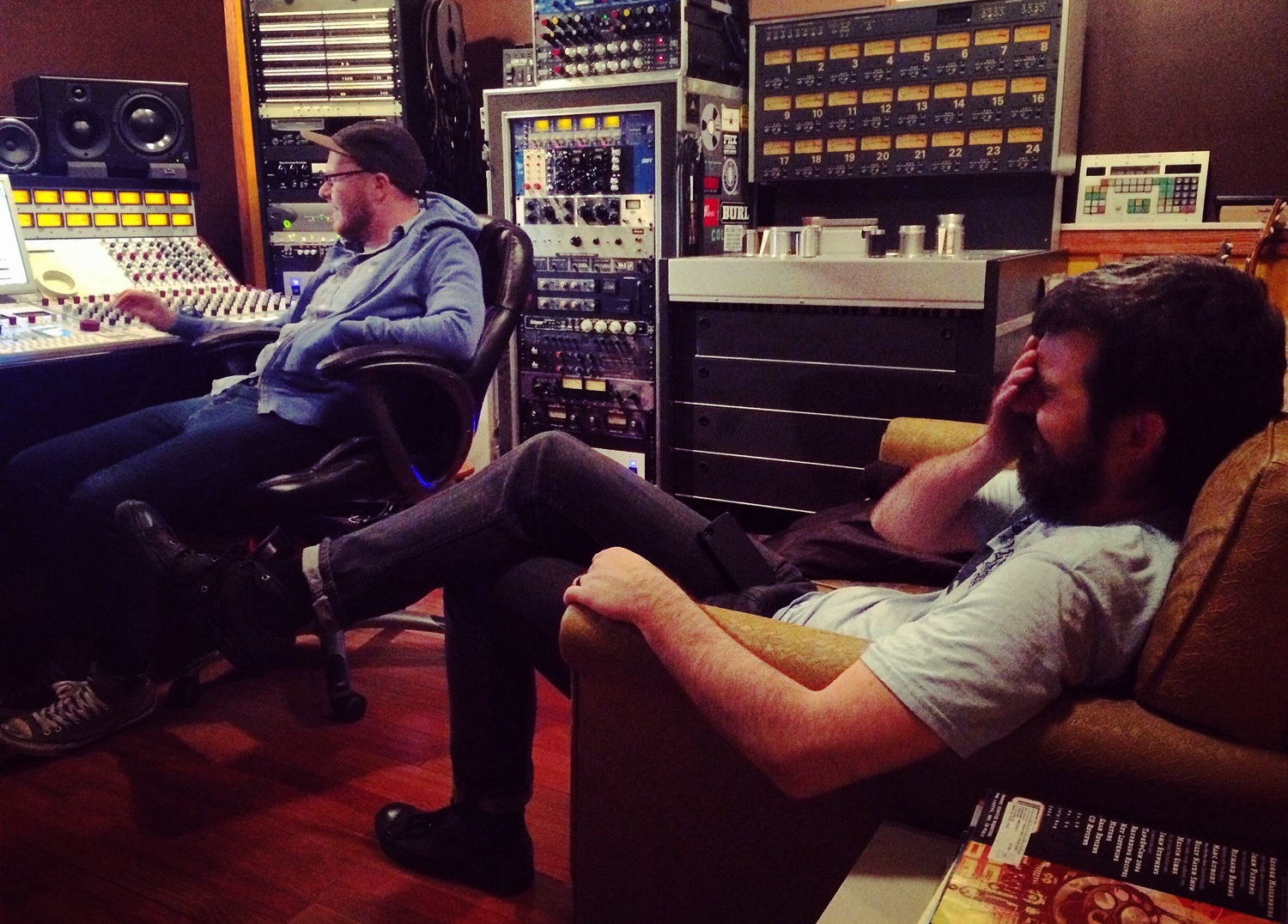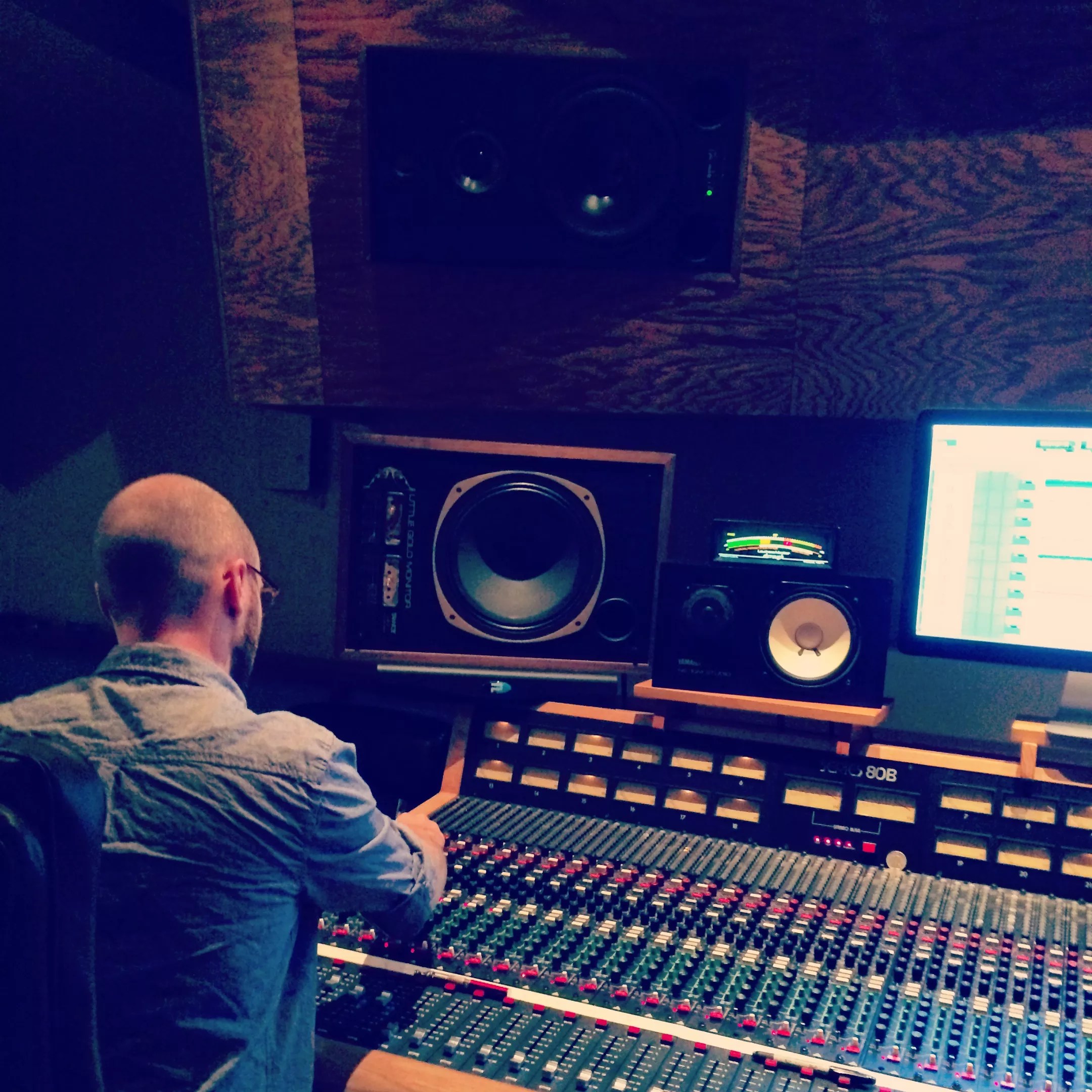
Lindsay Cates

Audio By Carbonatix
In Pound For The Sound, Phoenix New Times gets technical with local musicians about what gear they use to create their signature style.
Local sound engineer and drummer Dominic Armstrong has been busy. He works at FiveThirteen Recording and currently plays with local groups The SunPunchers and Jon Rauhouse Orchestra. Recently, Armstrong performed as part of the cast of Psyko Steve‘s fifth annual Rock Lottery at Crescent Ballroom.
Armstrong was born the in the small town of Ripon, England, about an hour and half from Leeds. His father was really into classical music, and Armstrong says that’s what got him into music at an early age. However, his journey with playing instruments did not start until he was in high school. That’s when he began playing acoustic guitar, although his heart was truly in electric. He was listening to stuff like Nirvana, Tom Waits, and Bob Dylan.
Flash forward to the year 2000, and Armstrong had found himself in “the States.” He picked up drums in 2005, and moved to Arizona in 2007. Armstrong was in the now-defunct Finding Grampa’s Monsters, and graduated from the Conservatory of Recording Arts and Sciences in 2009. He did a brief stint in Chicago as a an intern at Electric Audio and a freelance engineer, and returned to Arizona in 2012, landing his first job at FiveThirteen in early 2013. He’s been there ever since.
Recently, Armstrong coordinated a release of the album Kansas, which features several Arizona musicians writing songs all about the state of Kansas. So New Times talked with Armstrong about the album release, his position on songwriting, and his favorite microphones.
New Times: What’s the secret weapon of your sound? And how did that help you find your “signature” tone?
Dominic Armstrong: That’s a far more difficult question to answer than one might expect. I think part of being a drummer and an engineer is to not have a signature sound. These are both supportive roles that should always be secondary to the intentions of the song and the songwriter, so if my engineering or drumming becomes too “signature” then I feel like I’m taking away from the song rather than adding to it. Hurting versus helping is a constant.
But with all that said, as an engineer I’m a really big fan of textural and layered sounds if the song calls for it. Sometimes that means running the same guitar to two different amplifiers at the same time for the same performance so that there’s a duality that comes out of that part – or doubling vocals so little discrepancies between the two takes create some interesting nuances that pull on the listeners ear and warrant their attention.
Also, I think it’s important to embrace a little bit of cheese in your work. You know, like if that Phil Collins “In The Air” drum fill feels like the right thing to do – which, if you listen closely enough, it is – then you should try it. Don’t shy away from it because it’s too cheesy, a little bit of cheese often makes for a great performance, you can always delete it later, but I’d probably encourage you not to. As my friend Jon Rauhouse says, “If you want to sell a sandwich, you’ve gotta put cheese on it.”
What’s your favorite piece of gear in your collection and why?
Oh man, why are you doing this to me?! I’m so lucky to work at FiveThirteen, which is just packed to the brim with great equipment. My usual recording or mixing session occurs on a large-format console, and I get to use actual spring-and-plate reverbs with vintage equalizers and compressors and a real Hammond organ and real drums and coveted microphones. So, my favorite piece of gear is all of it?
I mean, if the studio were on fire – knock on wood that never, ever happens – I’d probably run in and grab the two Coles 4038 microphones. These are ribbon microphones that were originally designed for the BBC many, many moons ago as a broadcast mics for radio announcers. A few of them ended up at Abbey Road Studios and were used as Ringo Starr’s overhead microphones, so you know, they’re pretty iconic. But they’re so versatile and kind of make everything just sound good. So yeah, the 4038s. Sorry, I had to kind of walk my way into that answer.

Dominic hanging and laughing in the studio.
Catherine Vericolli
Any special pieces of gear acquired over the years? Any special story, or stories, behind your collection of tools?
To be honest, I work at someone else’s studio 99 percent of the time – shout out to Catherine Vericolli – which means that approximately 0.0001 percent of the gear is actually mine, and there’s probably 0.0001 percent of that which I actually covet. I am trying to break a bad habit of impulse buying cheap pieces of equipment after a few rounds at the bar. I’ve ended up with some things that, I’m happy to have, but I think I would have rather paid my rent. There’s a funny story about how I got my drum set, but if anyone is interested, they can ask me in person. It’s just funnier that way.
Just listened to your recently released track “Middle America.” Beautiful song. How did you go about recording this track and what instrumentation did you use?
Thank you. Musically, I’m pretty happy with it. The production and the lyrics … well … I kind of rushed through those parts out of necessity. It was written for the songwriting challenge I’ll talk about later, but for now:
I’m a big fan of collaboration. So after I had the skeleton of the chord progression and song structure, I called my friend Serena Fonze to come over and play the rhodes for me, she’s a great intuitive player and we have a good chemistry for communicating musically. My friend Johnny Terrill came to help me engineer the session while I was playing the drums. He’s awesome and I like having him in the studio, and he’s a fantastic guitar player so he laid down the acoustic guitar for me. What’s fun about guitar on this track is that the left ear is playing all first position open chords while the right ear is playing third position harmonic major or minor chords relative to the left. It’s hard to pick out in the track, but when you solo those two performances in the mix, there’s this incredible richness that I think adds to the tune. I’ll definitely be using that trick in the future.
Once that was done I just added a simple bass part to support the keys and then the electric guitar melody in the chorus. It was still kind of empty and I was procrastinating writing the lyrics so I put some more electric guitar in the verses. Eventually, I ended up deleting a whole section of the song that went to this 6/4 groove because I couldn’t pull of the vocal idea I wanted. I’m not the strongest singer, which leads me to deleting a lot of things out of songs I write. I think Ernest Hemingway said something like, “I take more words out than I leave in,” and I follow that maybe a little too closely. Finally, I doubled all my vocals, which I always do for my songs, hopefully the two performances playing against one another makes my voice sound better!

Domininc on the board at 513.
Catherine Vericolli
You had mentioned in our conversation that you started a group called Arizona Record Makers with the intentions of getting songwriters in Arizona better connected. Can you expand how this came to be and what your intentions are for the group?
Yeah, this is kind of a pet project that came out of a trip I took to Nashville last year. I went out there to clear my head a bit and catch up with some friends. The whole time, I couldn’t help but notice how deeply collaborative everyone was. Everyone was welcome at everyone else’s recording sessions, people were just sharing lyrical and harmonic ideas, people were lending gear out left and right, etc.
I thought maybe that kind of stuff was already happening in Phoenix, but if it was, I wasn’t in on those conversations or at least, it didn’t feel as natural. It’s not like I felt excluded from anyone, just that I didn’t feel included with everyone, if that makes sense? So, I made the the Arizona Record Makers group as a hopeful place of engagement and meeting ground between all the talent that’s in this town.
Shortly after making the [Facebook] page, my life kind of got in the way of “extracurriculars.” So there wasn’t much going on in the group until recently. But over these past holidays, I was visiting family in England, and with some extra time on my hands, I thought I’d give the group another push and asked who was still interested and what they would be interested in doing. So far so good, but I’d love to see more.
Ultimately, I’d like for new friendships and partnerships to be formed for myself, but more so for everyone else. There is so much talent in Phoenix and the surrounding areas and I’m in a position where I get to see a lot of it from a birds eye vantage point. I can very easily see how a one-off performance project could happen between people who might not currently know each other. Or how this songwriter could be a good match to help this other band if they needed it. Or there’s a band going to record and there is this other person who would be a great session player for them if they needed it.
It’s all about making connections that wouldn’t otherwise happen and making the process of music much more open and social. I hope that’s what comes out of this page, more than anything else and I hope that people are willing to look and ask for those opportunities if they present themselves.
You recently released your first “songwriters challenge” compilation with Arizona songwriters composing songs all about the state of Kansas. Can you please explain the “songwriters challenge” and how other Arizona songwriters can try and get involved?
Yeah, like I said, I asked what people in the group would be interested in doing, and Dario Miranda suggested doing some songwriting challenges. I thought it was a great idea and also something to get me writing songs again, which I haven’t been doing regularly for years. I think that’s true for a lot of people, songwriting is a talent they have but one they don’t practice for whatever reasons. These challenges are a way to flex those muscles a little bit and get the creative heart pumping, along with having a place to experiment and getting productive and motivating feedback. Again, socializing the creative process is something I’m fairly passionate about.
Anyway, I looked up holidays and important events in the month of January. Naturally, I thought about doing protest songs for inauguration day, but frankly, I don’t find it particularly challenging to come up with things to protest [under] the current president so I opted for something more difficult, which lead me to Kansas Day. Turns out that January 29 is Kansas day. In 1861, Kansas became the 34th state of the union and as such is celebrated as the state’s birthday. You know that now, you’re welcome. I don’t know anything about Kansas so I made it the theme on a three week challenge, participants would have to write and record an entirely original song and submit it by January 29, our day of celebration.
All in all, we had eight submissions, including mine, and I’m legitimately so impressed with everyone who did it. Again, the natural talent that is in this town never ceases to amaze me. Not to mention we have eight, entirely different genres. Well… maybe six, but still! And I don’t expect anyone to take this all that seriously, but everyone put in the effort and made something for themselves and us to listen to, which is an actual phenomena. I wouldn’t feel comfortable talking about this without also giving credit to Lauren Bailey who did the graphics for the Bandcamp page. If anyone needs album artwork or fliers or whatever, I highly recommend her.
I think we’ll probably end up with one of these every month, or at least every other month. Someone made a suggestion for what February’s songwriting prompt could be, so I’ll probably post something about that soon. If anyone wants to get in on the fun you just have to join the Arizona Record Makers group on Facebook to follow along. Again, I highly encourage collaboration. After all, the technology intends to connect us, so take advantage of it.